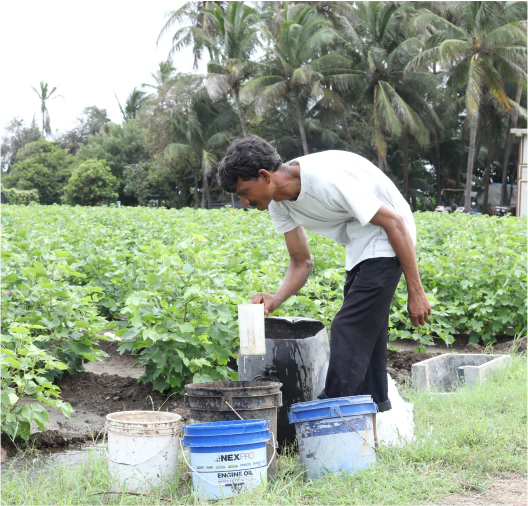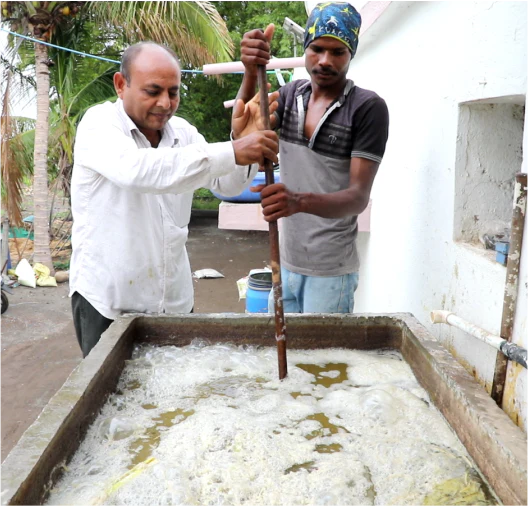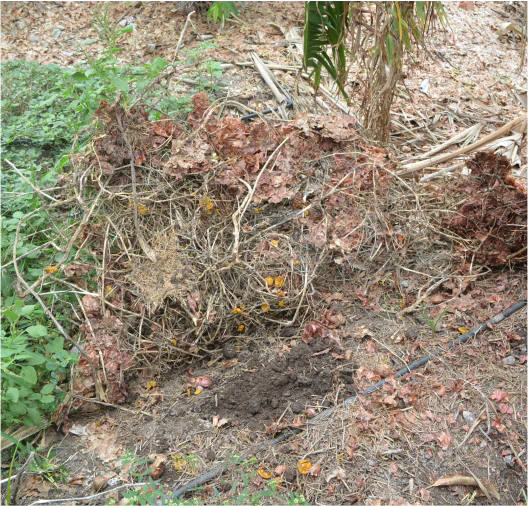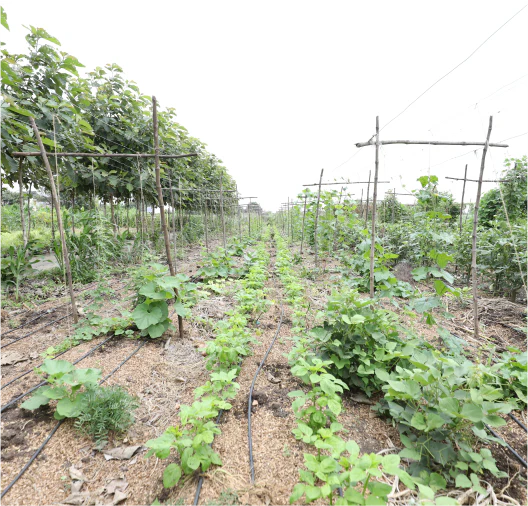Four Pillars of CBNF
-
Jeevamrutha
-
Bijamrutha
-
Achhadana
-
Whapasa

1. Jeevamrutha
In Sanskrit ‘Jeeva’ means life, and ‘Amrutha’ means elixir, together, the word Jeevamrutha literally means the elixir of life, a moniker it has earned with time. Jeevamrutha has a variety of preparation recipes, depending upon the soil it is being made for. However, the primary ingredients for this organic fertilizer remain the same – fresh cow dung, aged cow urine, water, pulse flour, jaggery and local soil. True to its name, this is the perfect microbial culture which replaces the lost microscopic fauna of the soil. This preparation can be used in liquid, semi-solid, or dry states depending upon your purpose.

2. Bijamrita
Seeds are at the most vulnerable from soil borne diseases and insects when they are first planted. This becomes most important when planting after the monsoon period, a prime period for seed borne diseases. Bijamrutha in Sanskrit means the elixir of seeds. Bijamrutha is a concoction that is used to coat seeds before planting, helping stave off any diseases or pests. As opposed to expensive fungicides and pesticides, Bijamrutha works as a natural treatment for seed safety, and maximizes yield. Bijamrutha’s ingredients vary for different seeds, however, the primary ingredients remain – Cow urine, tobacco, neem leaves, and lime. Together, these ingredients not only provide an active repellent to pests, but also safeguard the seed thanks to their natural antimicrobial and antifungal properties.

3. Achhadana
The top soil, under natural conditions, is usually covered with a layer of fallen leaves and plant detritus. Achhadana, or moveable cover in Sanskrit, refers to this natural cover of the topsoil. Mulching, as it is known in English, is a process of protecting the topsoil. There are a variety of mulching techniques that can be used depending on the soil’s requirements. The basic mulching technique protects the soil during cultivation while ensuring it is well aired and moist. Dead leaves, straw, or detritus of previous crops can be used as an organic cover as well. In some cases, a separate crop can also be used as a topsoil cover.

4. Whapasa
Cow Based Natural Farming turns the conventional notion of irrigation on its head. Plants depend on the water molecules present in the air and the soil to meet their water requirements. Whapasa is a technique used to reduce the overall water requirements as mentioned in conventional farming, and improving the soil’s water withholding capacity. The practice of Whapasa varies greatly depending on soil condition. Primarily, it embraces the idea of irrigating the crops at noon ensuring this is done only in alternate furrows. The heat of the afternoon sun, and the rapid absorption capacity of the CBNF treated soil, ensures a greater amount of water molecules in the soil.
Benefits Of CBNF
-

100% Natural Produce
Conventional farming is hugely detrimental to ecosystems, instead of leveraging natural flora and fauna to grow nutritious produce, it works against it. CBNF, on the other hand, protects the soil ecosystem and supports cultivation in a symbiotic fashion. Instead of using chemical products to protect and nurture crops, it leverages the organic goodness of cow based products. Cow based natural farming has been found to improve the beneficial microfauna in the soil, while keeping disease bearing fungal and microbe borne diseases away.
-

Ecological Balance
Conventional farming is hugely detrimental to ecosystems, instead of leveraging natural flora and fauna to grow nutritious produce, it works against it. CBNF, on the other hand, protects the soil ecosystem and supports cultivation in a symbiotic fashion. Instead of using chemical products to protect and nurture crops, it leverages the organic goodness of cow based products. Cow based natural farming has been found to improve the beneficial microfauna in the soil, while keeping disease bearing fungal and microbe borne diseases away.
-

Breaks the Debt Cycle
Farmers are always chasing the debts incurred from buying fertilizers, pesticides, or machinery. CBNF, also known as zero budget natural farming, breaks this cycle. It helps farmers make most of the resources they have on hand to improve the quality of their soil and produce. It reduces the farmer’s dependence on chemicals, and prevents him from being choked by the debt trap that is the fate of so many around the country. It helps them get a higher market rate for their 100% natural produce and thus helps them improve their margins as well.
-

Reduces Water & Electricity Usage
Cow based natural farming eschews the idea of over-dependence on irrigation. Instead, it creates an environment where the overall water retention capacity of the soil is improved, thus limiting the amount of water spent in irrigating the soil. This is achieved through a change in the irrigation timings, as well as the practice of mulching. With limited use of water, water pumps too are used less, which saves the farmer electricity costs. This saved cost helps the farmer in seeing better margins on their produce and helping them better their financial status.
When the Green Revolution swept India, the intention was to increase the agricultural yield to feed the nation. It gave tremendous results, the cost of it, however, was soil and ground water saturated with chemicals in major swathes of arable land. This situation prompted the revival of an ancient farming technique, we lovingly refer to as Cow Based Natural Farming (CBNF).
This format of farming is also known as zero-budget farming since it does not cost the farmer anything. It prevents the perpetuation of farmer debts and breaks the cycle. Carrying forward in the philosophy of the Green Revolution, CBNF ushers in an age of growing naturally, and plentifully.
This ecologically sustainable means of farming is beneficial to both, the farmer and nature. But its greatest beneficiary is the consumer. Cow based natural farming allows farmers to grow food and Ayurvedic products with zero use of chemicals.
CBNF practice is a natural course of action for farmers looking to improve their soil health, and receive a premium price for their produce. This process uses a series of recipes passed down from generations, and improved upon with research, practice and technology.



